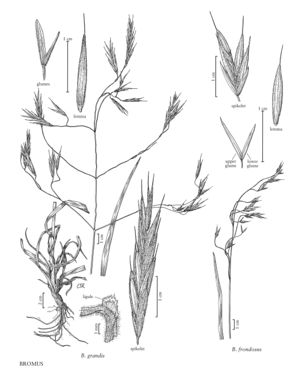Difference between revisions of "Bromus grandis"
FNA>Volume Importer |
imported>Volume Importer |
||
| (8 intermediate revisions by 2 users not shown) | |||
| Line 7: | Line 7: | ||
|synonyms={{Treatment/ID/Synonym | |synonyms={{Treatment/ID/Synonym | ||
|name=Bromus orcuttianus var. grandis | |name=Bromus orcuttianus var. grandis | ||
| − | |authority= | + | |authority= |
| + | |rank=variety | ||
}} | }} | ||
|hierarchy=Poaceae;Poaceae subfam. Pooideae;Poaceae tribe Bromeae;Bromus;Bromus sect. Bromopsis;Bromus grandis | |hierarchy=Poaceae;Poaceae subfam. Pooideae;Poaceae tribe Bromeae;Bromus;Bromus sect. Bromopsis;Bromus grandis | ||
| Line 20: | Line 21: | ||
-->{{Treatment/Body | -->{{Treatment/Body | ||
|distribution=Calif. | |distribution=Calif. | ||
| − | |discussion=<p>Bromus grandis grows on dry, wooded or open slopes, at elevations of 350-2500 m. Its range extends from central California into Baja California, Mexico.</p> | + | |discussion=<p><i>Bromus grandis</i> grows on dry, wooded or open slopes, at elevations of 350-2500 m. Its range extends from central California into Baja California, Mexico.</p> |
|tables= | |tables= | ||
|references= | |references= | ||
| Line 29: | Line 30: | ||
-->{{#Taxon: | -->{{#Taxon: | ||
name=Bromus grandis | name=Bromus grandis | ||
| − | |||
|authority=(Shear) Hitchc. | |authority=(Shear) Hitchc. | ||
|rank=species | |rank=species | ||
| Line 36: | Line 36: | ||
|basionyms= | |basionyms= | ||
|family=Poaceae | |family=Poaceae | ||
| + | |illustrator=Cindy Roché | ||
| + | |illustration copyright=Utah State University | ||
|distribution=Calif. | |distribution=Calif. | ||
|reference=None | |reference=None | ||
| Line 41: | Line 43: | ||
|publication year= | |publication year= | ||
|special status= | |special status= | ||
| − | |source xml=https:// | + | |source xml=https://bitbucket.org/aafc-mbb/fna-data-curation/src/200273ad09963decb8fc72550212de541d86569d/coarse_grained_fna_xml/V24/V24_296.xml |
|subfamily=Poaceae subfam. Pooideae | |subfamily=Poaceae subfam. Pooideae | ||
|tribe=Poaceae tribe Bromeae | |tribe=Poaceae tribe Bromeae | ||
Latest revision as of 16:22, 11 May 2021
Plants perennial; not rhizomatous. Culms 70-180 cm, erect; nodes 3-7, pubescent or puberulent; internodes pubescent, puberulent, or glabrous. Sheaths densely pubescent, hairs to 1 mm, collars with hairs to 2 mm, midrib of the culm leaves not abruptly narrowed just below the collar; auricles sometimes present; ligules 1-3 mm, densely pubescent to pilose, obtuse, lacerate; blades (13)18-38 cm long, 3-12 mm wide, flat, sparsely to densely pubescent on both surfaces. Panicles 14-27 cm long, very open, nodding; branches flexuous, usually widely spreading, with spikelets near the tips. Spikelets 20-37(45) mm, elliptic to lanceolate, terete to moderately laterally compressed, with 4-9(10) florets. Glumes pubescent, with prominent veins, margins not bronze-tinged; lower glumes 4-8.5 mm, (1)3-veined; upper glumes 7-10 mm, 3(5)-veined, not mucronate; lemmas 9.5-14 mm, lanceolate, rounded over the midvein, backs pilose, pubescent, or glabrous, margins pilose, not bronze-tinged, apices subulate to acute, entire; awns 3-7 mm, straight, arising less than 1.5 mm below the lemma apices; anthers 3-6 mm. 2n = 14.
Discussion
Bromus grandis grows on dry, wooded or open slopes, at elevations of 350-2500 m. Its range extends from central California into Baja California, Mexico.
Selected References
None.
